Our flagship project is the Festival - the world’s largest youth drama festival.
About our impactLooking for ideas? Here, you'll find a range of What You Will example responses from our celebrity Patrons and supporters that will challenge and inspire you to create your own speech for a Shakespeare character. Keep checking back, we will adding more celeb examples to this page over the coming weeks!
Our What You Will Example Entries
Jacoba Williams – Portia, Julius Caesar
Jacoba is an actor from the Midlands who first encountered CSSF’s work when she was a student in her secondary school participating in our Theatre Festival. Jacoba’s recent work includes The Winter’s Tale, The Fir Tree, A Midsummer Night’s Dream and Our Verse in Time (all for Shakespeare’s Globe). Next year, she will be seen as Olivia in Twelfth Night for CBEEBIES, directed by Elle While.
This speech explores Portia’s motive behind her death in Julius Caesar. Whilst Portia’s character is given a voice by Shakespeare when confronting her husband Brutus earlier in the play, she’s not given the same space as characters such Juliet or Lady Macbeth to tell the audience what drives her to her painful death. Until now...
Eshaan Akbar – Mercutio, Romeo and Juliet
Eshaan has appeared on shows such as Live at the Apollo, Mock the Week, QI (becoming the first person of Bangladeshi heritage to appear on these shows), The Now Show, Frankie Boyle’s New World Order, The Big Asian Stand Up Night, Sunday Morning Live, A Pie and a Pint, and many more.
He is also an accomplished radio presenter and podcast host. As well as having his own shows on the BBC Asian Network and LoveSport, he can be heard on podcasts including But Where Are You Really From (BBC Sounds) and Shame is Delicious. He’ll soon be seen in season 4 of Netflix’s Sex Education.
In this speech, Eshaan gives voice to Mercutio – a character that has a lot to say about most things – but is sadly silent once Shakespeare has killed him off. Now we get the chance to find out what Mercutio really thinks about his fate..
Alfred Enoch – Dennis, As You Like It
I envisaged the speech going at the end of Act I Scene 1. It’s written as if Dennis overhears Oliver’s plot with Charles and his subsequent soliloquy (“Now will I stir this gamester”), then comes forward after Oliver’s exit.
The first Shakespeare play I performed professionally was Timon of Athens. I played a character that we called “Philotus” but in the Folio he’s not even given a name; he’s only known as “Servant.” As that implies, it was only a small part, but he did have a soliloquy - a chance to turn to the audience and let them into his experience. It’s one of the things I love about Shakespeare. He’s so fascinated by people that even the smallest parts are often given a life of their own. Dennis is, I think, the smallest part in As You Like It. He has one scene and only two lines, but he does have a name, which we learn when Oliver calls for him - “Holla, Dennis!” It’s a little detail but a noteworthy one. This is by no means a given. There are even famous parts in Shakespeare who are never named, such as the fool in King Lear and the nurse in Romeo and Juliet. In a way, Dennis is the opposite of the servant that I played. One has a speech but no name and the other has a name but no speech. However, both characters have a little detail that helps to humanise them. In Dennis’ case, it was enough to pique my interest, so I wanted to explore what he might say if he were given an opportunity to speak his mind.
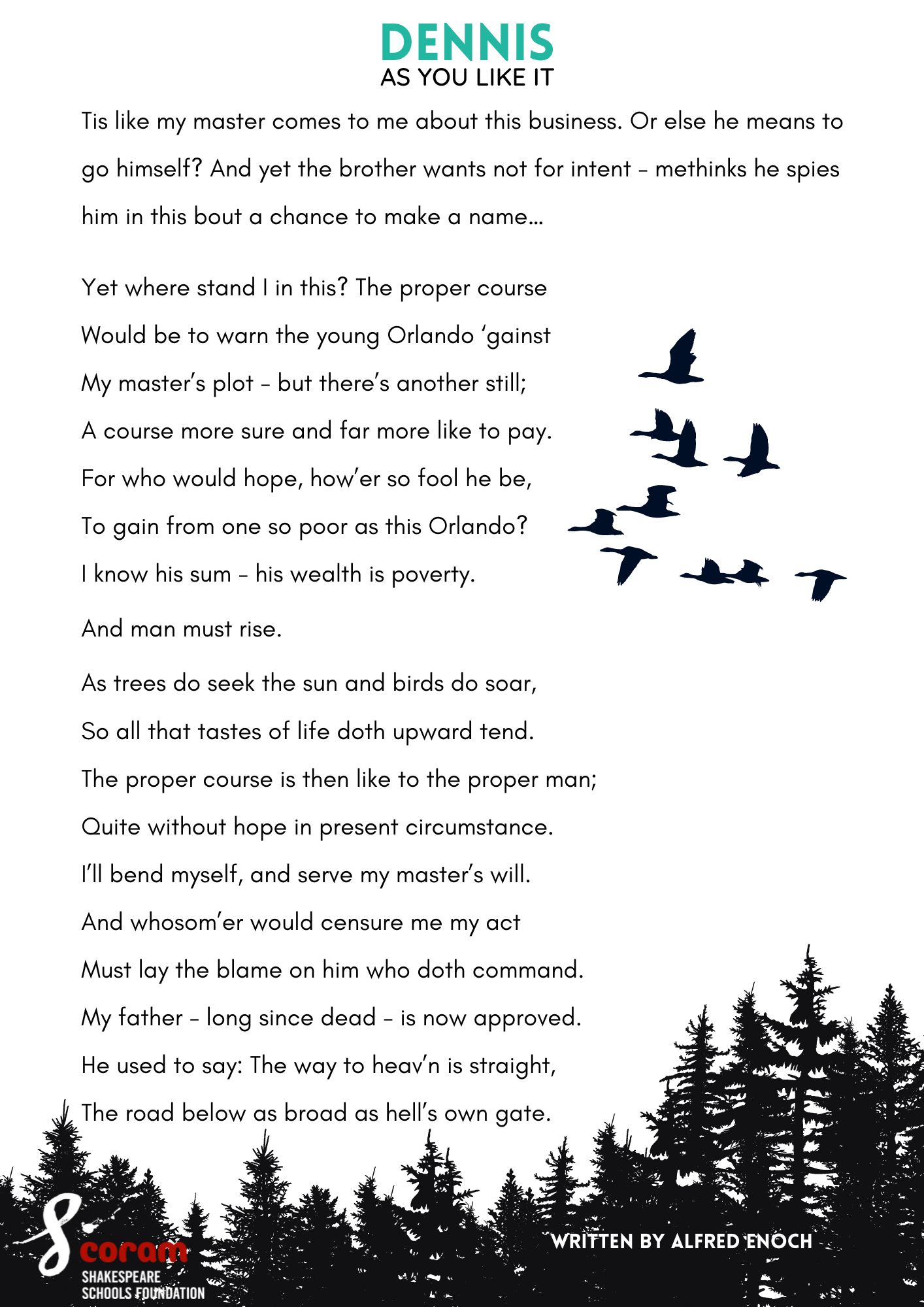 |
Roberta Livingston – The Wall, A Midsummer Night's Dream
Roberta Livingston is a writer/performer & facilitator who has worked with various theatres across the country. As a performer she has appeared in productions at the National Theatre and the Gate Theatre and as a writer she has written for The MonoBox, Talawa Theatre Company and the Almeida Theatre.
She chose to write a monologue from Wall's perspective in A Midsummer Night's Dream. "I've always enjoyed the Mechanicals storyline in Dream because it's silly and a lot of fun and there are a lot of characters in this play who mainly focus on their own desires and a thought occurred to me, what about poor old Wall? Or 'vile' wall as they refer to it? It made me think, if Wall did have a voice, what would it say?"
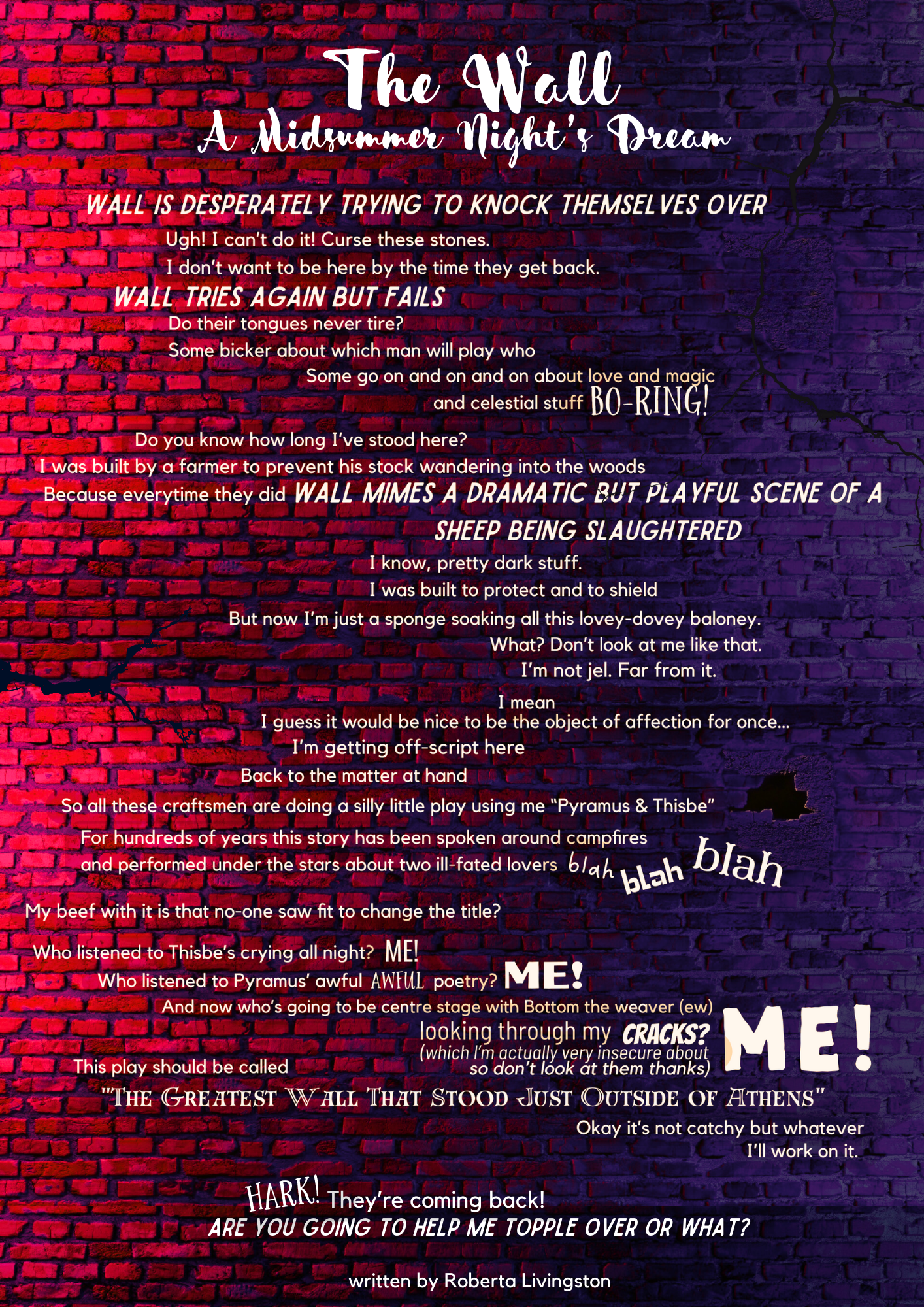 |
Taliesin – Macduff, Macbeth
This speech has been created by Taliesin, one half of Taliesin & Evitel, a duo who stream and make YouTube videos... mainly about video games.
"I’ve always been fascinated by what Macduff got up to in the play Macbeth between finding the murdered King Duncan and disappearing to England to follow Prince Malcolm, and now we know... he was a streamer! Which is lucky for me..."
Paterson Joseph – Brutus, Julius Caesar
Paterson played the role of Brutus in 2012 in a production of Julius Caesar for the Royal Shakespeare Company. This speech imagines a silent moment as Brutus dies at the hands of his servant.
Need a catch-up? Get the full story of Shakespeare's Julius Caesar, with our 10 Events summary.
Ben Willbond – Yorick, Hamlet
Ben Willbond is an award-winning actor and screenwriter. He has appeared widely on television and in film, including the Bafta-nominated Ghosts (BBC), Good Omens (BBC/Amazon), Quacks (BBC), Playing House (USA Network), Horrible Histories (BBC), The Thick of It (BBC).
His debut feature film, Bill, which tells the story of how hopeless lute player Bill Shakespeare leaves his family and home to follow his dream received critical acclaim on its release in UK cinema in 2015. For What You Will Ben has reimagined another famous Elizabethan hero...
‘This rather silly monologue imagines what Yorick would have said had Shakespeare given him the chance, which as we know he didn’t... he killed him and then buried him before Hamlet even began. Alas, poor Yorick.’
Llio Evans – Mustardseed, A Midsummer Night's Dream
Welsh soprano, Llio Evans, has performed roles for English National Opera, Garsington Opera, Longborough Festival Opera, Opera Holland Park, English Touring Opera, Music Theatre Wales, Opera Della Luna and Charles Court Opera. For her speech, Llio has imagined the daily challenges facing Mustardseed, one of Titania’s fairies in A Midsummer Night’s Dream – who is not at all happy with all the work they have to do. Llio has set her speech as a parody to Largo al factotum from The Barber of Seville, an opera composed by Rossini.
Dame Harriet Walter - Gertrude, Hamlet
“When I was young, I played Ophelia in Hamlet, and I used to watch from the wings in the scene where he rails at his mother Gertrude in her bed chamber, and she never says anything back... to defend herself or explain her position... and I sat there thinking ‘Why don’t you say anything?’ So, this is what I think she would say, if she could.”
Father JC – Friar Lawrence, Romeo and Juliet
Father JC is the creation of Laura Wyatt O’Keeffe, an Irish multi-award nominated performer, writer and drag king. Laura’s work explores gender politics, labels and rebels. She choose Friar Lawrence because "I’ve always wondered what drives him to help Romeo and Juliet, to put together such a dangerous plan and to risk his own livelihood. Is it purely political? Is it a power play? Or is it that he believes in true love?"
Beth Punnett - Cordelia, King Lear
Beth, one of CSSF’s Programmes Coordinators, loves poetry and decided to use the form to explore what Cordelia wishes to tell her father, King Lear, after his rejection in the play’s opening scene. ‘I have often wondered what her relationship with her father might have been like when she was younger. Postcards often capture memories, and so it felt fitting for Cordelia to use this to express how lost and misunderstood she feels following her banishment.’
Kev F – Lady Macbeth, Macbeth
Kev’s inspiration was Mike Leigh's play Abigail's Party from 1977. In this famous scene, Kev has retained most of Shakespeare's dialogue, but has also prioritised action and pace as is essential within the art of a graphic novel.
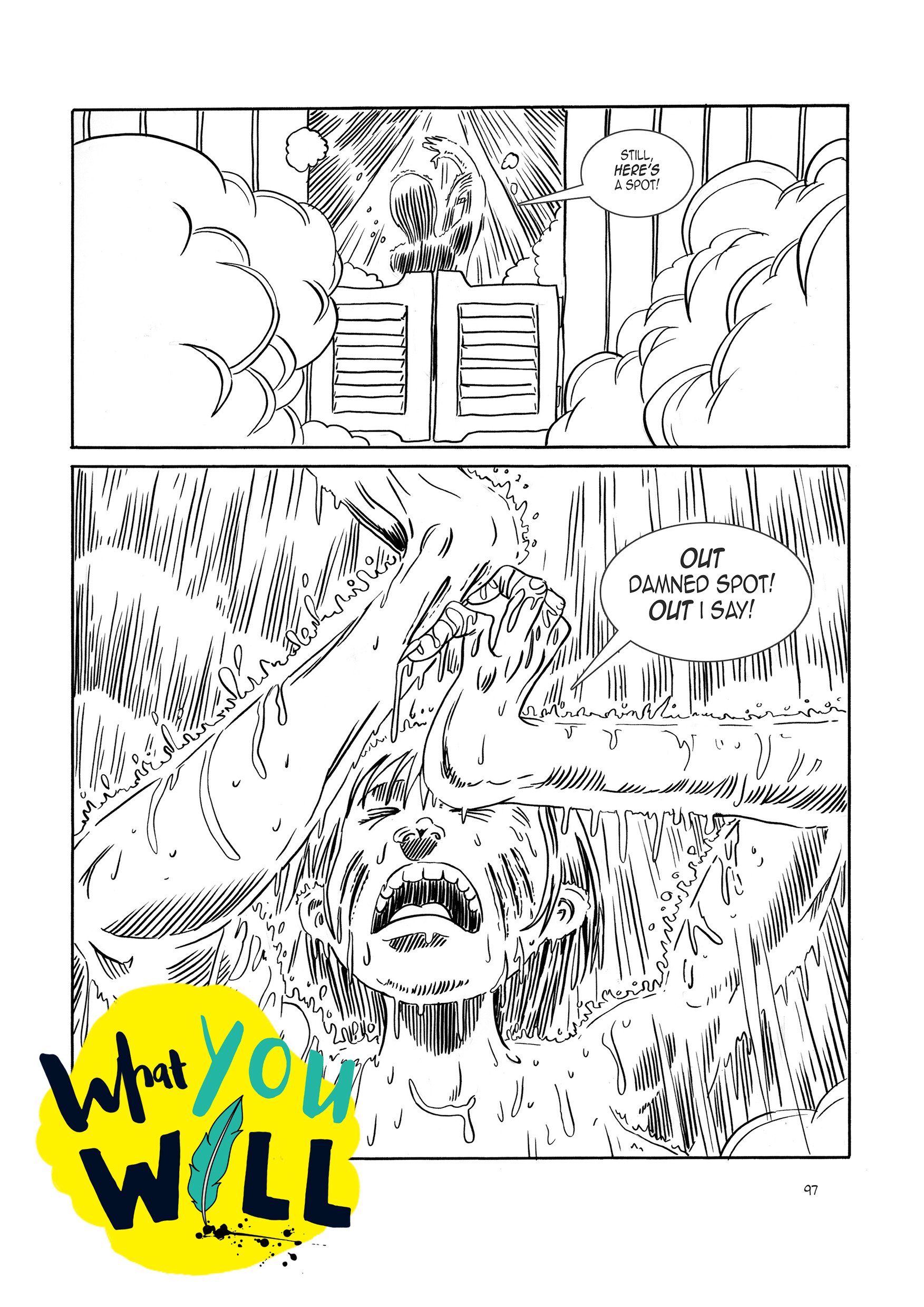 |
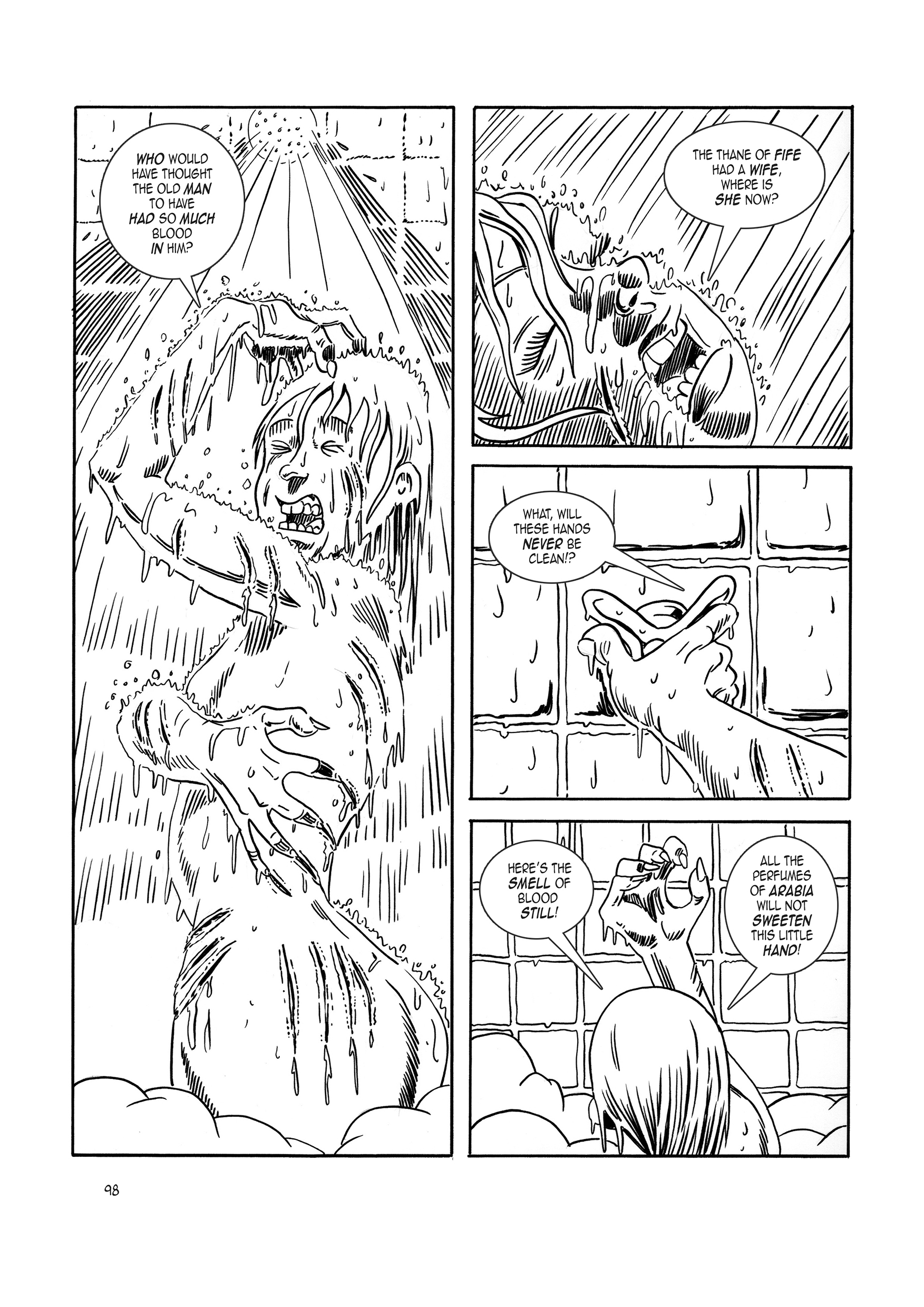 |
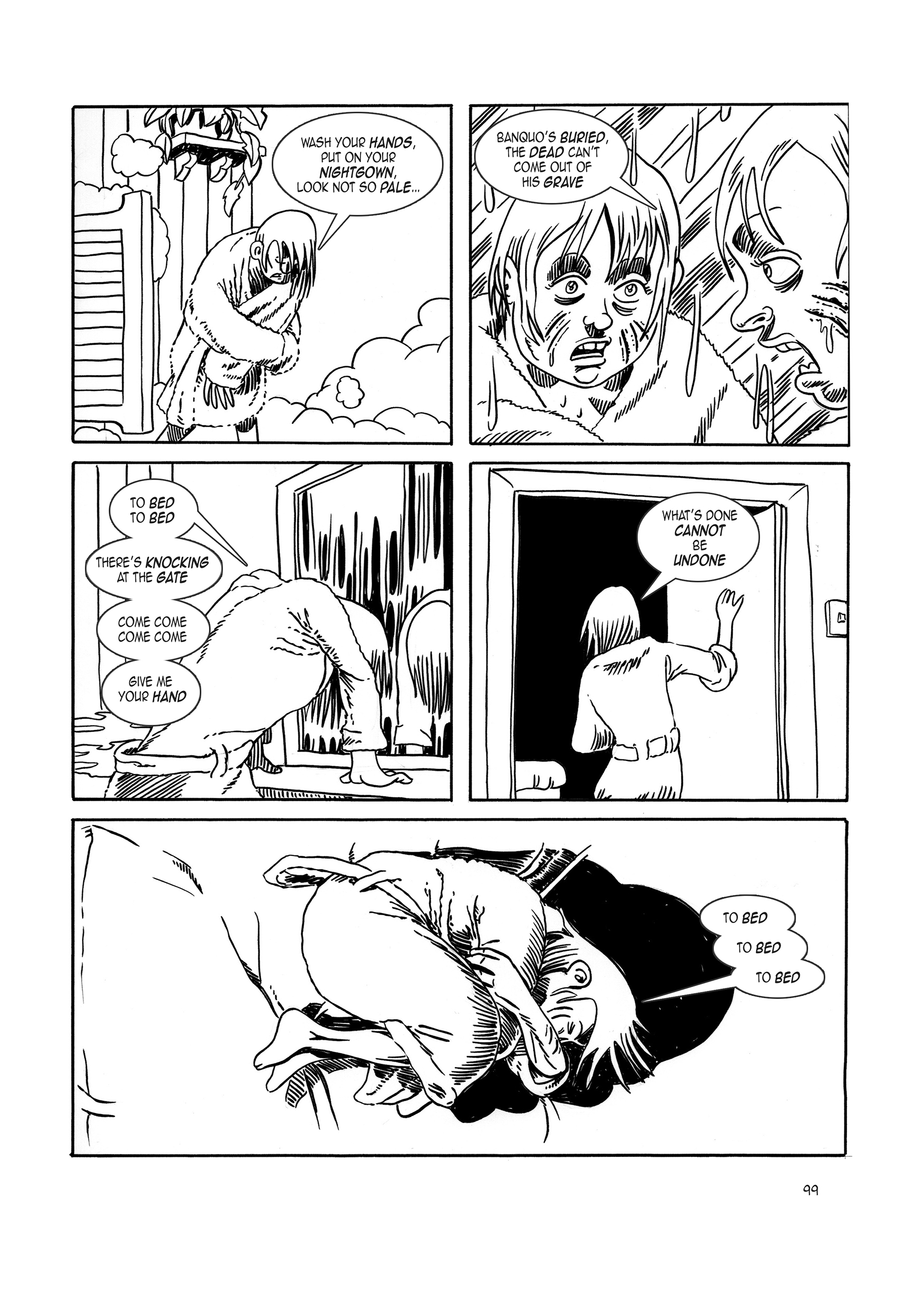 |
Love Kev F's cartoon, and want to find out more about Lady Macbeth? Click here for our character Q&A.
John Chisham – Benvolio, Romeo & Juliet
Whilst not working as a Schools Outreach Coordinator for CSSF, John is an actor and writer. “I chose Benvolio because the spotlight never shines on him – he's always the peace-keeper, in the background of the action. I wanted to explore Benvolio’s place in the world, and how he may express himself if he was alive today.”
Want more Benvolio content? Check out our Romeo and Juliet narrative story.
John Heffernan – Benedick, Much Ado About Nothing
John Heffernan played the role of Benedick in the National Theatre’s production of Much Ado About Nothing in 2022. He’s chosen to create a speech for Benedick “because he’s witty, funny, and after making some rather questionable life choices he gets to fall madly in love... and what’s not to love about that?”
Meet Benedick's witty opposite number, Beatrice, with our character Q&A.
Toby Park - Black Ill-Favor'd Fly, Titus Andronicus
Toby has worked in music and theatre as a busker, actor, variety performer, circus artist, improvising musician, composer, musical director, creative producer, graphic designer, director and physical comedy consultant.
Toby is also the managing Artistic Director of Spymonkey, a company he co-founded alongside Aitor Basauri and Petra Massey. Spymonkey is the UK’s leading physical comedy ensemble and have been making sublimely ridiculous theatre since 1998.
In this speech, Toby explores the role of the Fly in Titus Andronicus, a character which Spymonkey first explored in the production they co-created with Tim Crouch, The Complete Deaths.
Loose Willis – Shakespeare
Loose Willis is an award-winning London-based drag king and a Creative Associate of Pecs Drag King Collective.
“Some of my earliest memories of the theatre (and women dressing up as men!) are going on trips with my mum to see Shakespeare plays. I think sometimes when we talk about certain texts as ‘classics’ they can seem unapproachable, and we can miss the fun and mischief in them, so I tried to imagine William Shakespeare as a modern day influencer reviewing his back catalogue for his adoring fans - while not taking himself too seriously in the process.”
Barrie Rutter – Duke of York, Henry VI, Part 3
Barrie Rutter founded theatre company Northern Broadsides in 1992. He has acted in or directed 28 of Shakespeare’s plays. Here, he has composed a speech for the (beheaded) Duke of York at the end of Henry VI, Part 3. The speech is inspired by both Shakespeare’s words and an artwork created by Chris Vine, who Barrie commissioned to create images for all of Shakespeare’s 37 plays, a collection first exhibited at Dean Clough Galleries in Halifax.
This example contains moderate language which may not be suitable for viewers under the age of 12. Parents/guardians and teachers should review this example before sharing it with younger children.
Find out more about the project and how you can get involved here.
Katy Secombe – Betty the Bear, The Winter's Tale
Katy has graced the UK stage for many years, delighting audiences with everything from West End musicals to Shakespeare’s plays. Here she gives voice to a well-known, but silent Shakespearean character...
"In The Winter’s Tale, there’s a famous line - 'Exit, pursued by a bear'. A character called Antigonus is killed by a bear in the play, but I wanted to see things from the Bear’s point of view..."
Don't know the story of The Winter's Tale? Get the lowdown with our 10 Events summary.
Lauren Brewer – Helena, A Midsummer Night's Dream
As well as being one of CSSF's Programme Coordinators, Lauren is a director and writer with a particular interest in Queer and gender studies. She chose to explore Helena, a character she finds fascinating.
"Helena’s love and genuine care for Hermia has always stood out to me as much more convincing than her willingness to follow a man who hates her into the forest. I chose to explore Helena's queerness, giving her more agency in her choice to enter the woods and allowing her to begin to ponder her own identity and reasoning."
Coram SSF is a cultural education charity that exists to instil curiosity and empathy, aspiration and self-esteem, literacy and teamwork - giving young people the confidence to see that all the world is their stage.
Learn more about us
